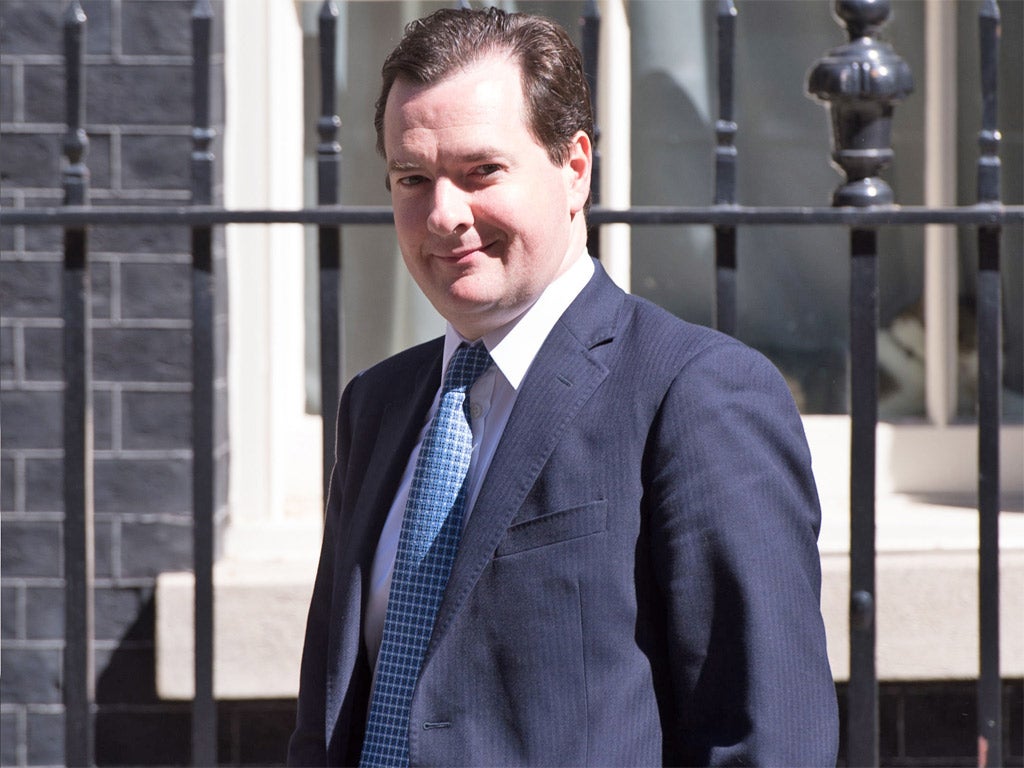George Osborne’s threat to ministers: Cut now, or face worse to come
There is growing speculation that spending on schools will be squeezed by £1bn, even though it is officially one of three 'ring-fenced' budgets along with health and overseas aid

George Osborne has warned Cabinet ministers who are refusing to reduce their spending that they will be punished with deeper cuts if they hold out until the last minute in the hope of getting a better deal.
The Chancellor will announce £11.5bn of cuts for the 2015-16 financial year in three weeks – but so far only £2.5bn have been agreed, as senior members of the Government battle to protect their own departments from further suffering.
There is growing speculation in Whitehall that spending on schools will be squeezed by £1bn, even though it is officially one of three “ring-fenced” budgets along with health and overseas aid.
“The clock is ticking,” Mr Osborne told the weekly meeting of the Cabinet during a progress report on the government-wide spending review. By implication, he threatened to drag Cabinet colleagues resisting the Treasury’s demands in front of the “star chamber” of ministers to justify their department’s bid. That could result in bigger cuts being imposed on them by their fellow ministers.
The star chamber, led by Mr Osborne and his Liberal Democrat deputy Danny Alexander, will meet for the first time during the current spending round this week to discuss budgets which range across more than one Whitehall department.
No minister has yet been summoned for an “inquisition” by the body and the Chancellor still hopes that this last resort will prove unnecessary. Despite his warning to the Cabinet, he insists his review is making good progress and believes Conservative and Lib Dem ministers are united in their drive to find £11.5bn of cuts.
Seven smaller departments have settled with the Treasury. The unresolved budgets include defence, education, business, transport, local government and the environment.
Theresa May, the Home Secretary, is defending counter-terrorism and police spending after the terrorist attack in Woolwich, which ministers believe has strengthened her hand. She is among the ministers thought to be close to reaching agreement with the Treasury.
The special protection for the health, education and international aid budgets is coming under pressure. Although Treasury sources insist they will be maintained, some ministers believe the lines will be blurred.
Michael Gove, the Education Secretary, is in talks with Mr Osborne on how schools spending should be defined, amid speculation that it could be trimmed by £1bn.
Jeremy Hunt, the Health Secretary, is resisting moves by other ministers to reclassify part of their budget as NHS spending, arguing that his own department is already under enormous pressure.
Vince Cable, the Business Secretary, wants to switch the Medical Research Council budget to Mr Hunt’s department. Mr Cable has offered savings of more than £500m but is fighting hard to preserve spending on skills, science, research and innovation on the grounds that they are vital to securing economic growth. He has been backed by business leaders.
Some defence spending may be funded by the Department of International Development and the budget for defence equipment will rise by 1 per cent. But Philip Hammond, the Defence Secretary, is fighting Treasury attempts to cut other parts of his budget. Mr Osborne is awaiting the delivery of an efficiency review of the Ministry of Defence by Sir Jeremy Heywood, the Cabinet Secretary.
Mr Hammond is among the ministers who want a further raid on welfare in order to protect their own departments. Iain Duncan Smith, the Work and Pensions Secretary, has offered a £3bn squeeze, by curbing housing benefit for under-25s and restricting new payments for children to two in each family.
That has been blocked by the Lib Dems, who have ruled out more benefit cuts after agreeing to cap the annual rise in them at 1 per cent for three years. Nick Clegg’s approach has been backed by Mr Osborne and David Cameron because the two Coalition parties struck a deal that no more welfare savings would be sought for 2015-16. The deal is holding at present but there is an outside chance of a last-minute push for more welfare savings if the Chancellor falls short of his £11.5bn target. But a Lib Dem minister said: “Welfare is the red line we will not cross.”
Mr Osborne will use his Commons statement on 26 June to give a progress report on his plan to cap some elements of welfare, such as housing benefit, but this will not yield savings in time for 2015-16.
Ed Miliband is expected to announce Labour’s support for a form of welfare cap in a speech on Thursday. A new poll by Survation for the LabourList website found public support for Labour’s plan to invest more money in jobs and growth. Some 48 per cent of people would be happy to see higher borrowing if it meant spending was increased on creating jobs and growth, whilst 39 per cent would prefer the Government not to borrow more - even if that meant less investment in jobs and growth.
Join our commenting forum
Join thought-provoking conversations, follow other Independent readers and see their replies
Comments
Bookmark popover
Removed from bookmarks